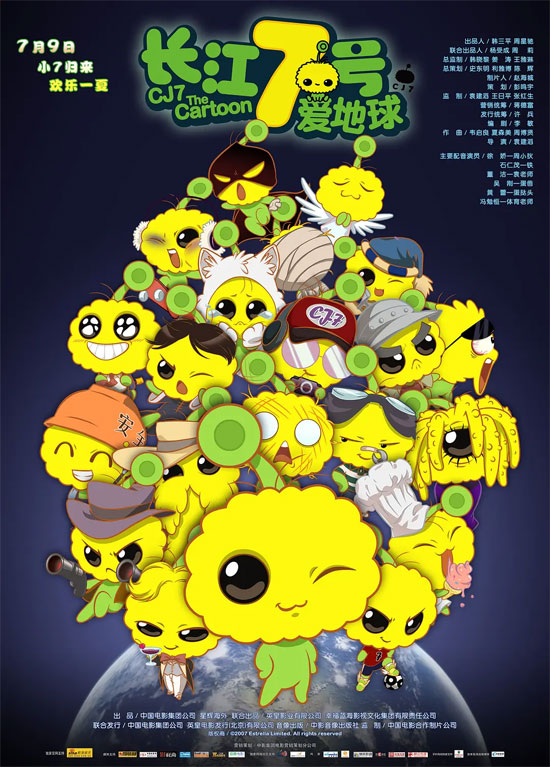Film Name: 长江7号爱地球 / CJ7:The Cartoon

In the world of animation, two things are almost guaranteed to have no future: one is the tale of princes and princesses, and the other is the story of pets in another world. Prince-and-princess tales always end abruptly at the kiss, because once married, the prince and princess cease to be royalty—they become utterly unromantic husband and housewife. Similarly, the beautiful companionship between an otherworldly pet and its protagonist always ends abruptly at the moment of parting. No otherworldly pet can stay with its human forever; its arrival inevitably seals its tragic farewell.
“CJ7: The Cartoon” tells precisely such a story of an otherworldly pet. In these tales, the closer the bond between pet and protagonist grows, the more heartrending the departure becomes. The screenwriter’s task is almost entirely to pour every effort into forging their friendship, only to then devise a plausible exit strategy for the pet. This inevitably brings to mind the classic isekai pet masterpiece “Doraemon.” Though I still don’t know Doraemon’s true farewell method, my deep attachment to his profound friendship with Nobita makes their parting utterly unbearable. Thus, the unresolved ending of “Doraemon” remains a comforting flaw in my heart.
Why is the farewell of otherworldly pets so tragic? Because they invariably serve as a sacrificial pawn in the protagonist’s journey of growth—meaning the lessons the protagonist learns come at the cost of losing their dearest companion. This creates a profound dilemma: should the protagonist choose to grow up or cling to their beloved pet? This inner conflict is the core of the tragedy. Isn’t that exactly what happens in “CJ7: The Cartoon”? Xiao Di and his classmates grasp the importance of environmental protection at the cost of losing 7-Zai.
Regarding the differing endings in the “CJ7” movie and cartoon, I experienced distinct forms of sorrow. In the movie, 7-Zai dies to save Xiao Di’s father; in the cartoon, it dies to save nature. If the former leans more toward human emotion while the latter emphasizes public welfare, I favor the more human-centered ending. Xiao Di and 7Zai’s bond is most poignantly conveyed through their deeply personal farewell. Transforming the heartfelt companionship between protagonist and pet into a message about protecting nature feels somewhat contrived.
However, compared to the live-action version, I feel the animated adaptation fully leverages animation’s strengths in artistic exaggeration and imagination. Examples include the super-powered electric fan, the flying bicycle, and the hilariously over-the-top scene where countless clones of the father rush to meet the deadline.
Textually, the film boasts another significant feature: beneath the tragic template of an alien pet’s inevitable fate, it weaves a tender subplot exploring father-son bonds. While such films typically rely on portraying the protagonist’s companionship with a pet, culminating in heart-wrenching separation, the simple yet sincere bond between Xiao Di and his migrant worker father stands out as a true highlight. The warmth of this impoverished single-parent household transcends the bond between protagonist and pet. At times, I even felt that it was precisely this familial affection that gave 7-Zai its true strength—the courage to sacrifice itself—because it had long regarded Xiao Di, his father, and everyone else as its family.
I believe the film’s true humanistic value lies in Xiao Di never looking down on his migrant worker father, in his father’s inner turmoil over failing to fulfill Xiao Di’s wishes, and in how their ramshackle shack beside a garbage heap harbors a more joyful life than any wealthy household. though at times these human values are overshadowed by the film’s overly relaxed characterization and slightly immature narrative techniques. In truth, if every viewer could consider the story from Xiao Di’s or his father’s perspective, it would be profoundly moving.
One final note: the theme song “CJ7: The Cartoon” is easily the best children’s song I’ve heard in years. Compared to Cecilia Cheung’s overly youthful version, the children’s rendition in the film carries far more heart. This song is bound to be a hit!
Please specify:Anime Phone Cases » CJ7:The Cartoon 2010 Animation Film Review: The Tragic Fate of Alien Pets That Can Never Escape